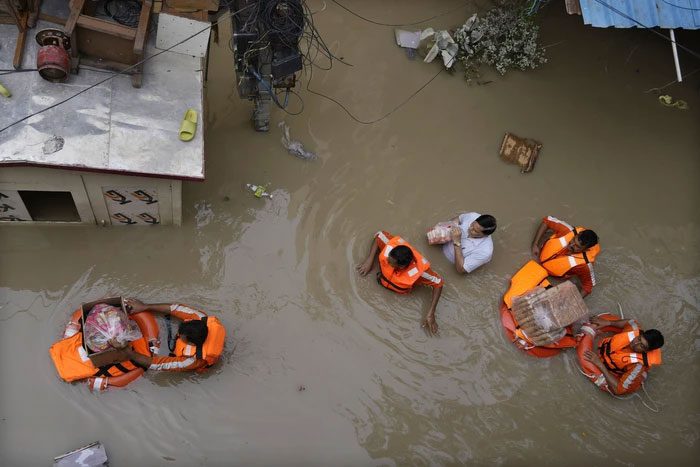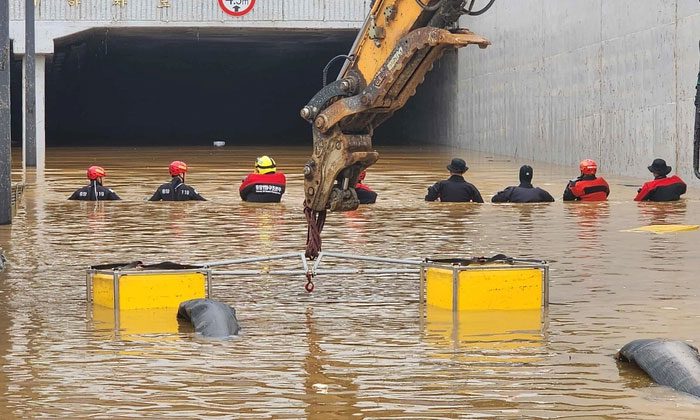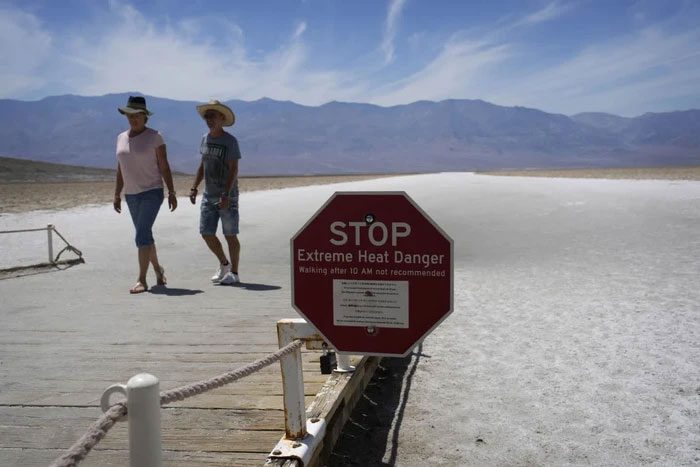This summer, the weather in the Northern Hemisphere resembles a script from an apocalyptic movie: scorching heat, flooding, and wildfires occurring everywhere. However, scientists warn that this may just be the beginning of unpredictable chaos if the world continues to pollute and heat the planet.
By mid-July, numerous records for extreme weather have already been broken
A prolonged heatwave has scorched significant parts of the Southern and Southwestern United States. Temperatures in Phoenix, Arizona, have reached at least 43.3°C for a record approximately 20 consecutive days, with emergency rooms overwhelmed by heat-related hospitalizations.
Southern Europe is experiencing one of the most severe heatwaves on record, as wildfires rage in Greece, Spain, and Switzerland. In Asia, temperatures have soared above 50°C in China, while parts of South Korea, Japan, and northern India are grappling with deadly floods.

A military helicopter drops water on a fire in the village of Pournari near Athens on July 18.
Severe flooding in India has claimed at least 100 lives, as reported by The Washington Post. The overflowing waters have also destroyed parts of highways and other infrastructure. Tikender Singh Panwar, former deputy mayor of Shimla, one of the hardest-hit cities, stated: “This is one of the worst floods I have ever seen in my life. It is truly a disaster. We can understand that the main reason is climate change. That’s nothing new.”

National Disaster Response Force (NDRF) personnel distribute relief items to those affected by the flooding trapped in the low-lying areas around the Yamuna River in New Delhi, India on July 14.

Rescue teams wade through an underground tunnel searching for trapped or missing individuals during the severe floods in mid-July in South Korea.
From July 3 to July 6, the four hottest days on record globally occurred, with the hottest being July 6, when the global average temperature “rose to an unprecedented level of 17.23°C,” according to Axios.
Wildfires in Canada continue to rage, burning nearly 25 million acres and disrupting air quality in various regions of the United States.
In a statement on July 18, Petteri Taalas, Secretary-General of the World Meteorological Organization, referred to this ongoing extreme weather pattern as the “new normal.”
The New Abnormal and Uncertain Future
However, some scientists are now disputing that definition.
Hannah Cloke, a climate scientist and professor at the University of Reading in the UK, stated: “When I hear that, I get a bit irritated because it’s not really the new normal. Unless we stop pumping greenhouse gases into the atmosphere, we don’t know what the future will look like.”
She is among many scientists warning that, although this summer is severe, it is just the beginning. They argue that as long as global temperatures continue to rise, the world should brace itself for increasingly escalating impacts.
Michael E. Mann, a prominent climate scientist and professor at the University of Pennsylvania, prefers to describe the weather we are witnessing as “the new abnormal.”
He told CNN that the new normal “misconveys the idea that we have just reached a new climate state and we just need to adapt to it.”
“But it is much worse than that. The impacts are getting increasingly severe as fossil fuel burning and warming continue. This is a fundamental shift towards impacts more devastating than ever as the Earth continues to warm.”
For scientists like Mann and Cloke, this year’s extreme weather is largely unsurprising. The development of El Niño, a natural phenomenon that influences global warming, only exacerbates the man-made warming that has been ongoing for an extended period and is expected to have a significant impact.
As the climate crisis worsens, humanity will face increasingly more surprises.
Peter Stott, a climate researcher at the UK Met Office, stated: “Extreme weather events will continue to become more severe, and our weather patterns may change in ways we cannot yet predict.”
“In some cases, the heat, wildfires, and floods have exceeded what climate models have predicted,” Mann said.
Mann added that the latest scientific research shows that the rise in global temperatures will halt almost immediately after we stop burning fossil fuels.
This summer provides further evidence that every small contribution to limit global warming is valuable, Cloke told CNN. The planet is approximately 1.2°C warmer compared to pre-industrial levels – still below the 1.5°C threshold that scientists warn should be maintained. However, even now, the consequences are deadly and widespread.

The rise in global temperatures will stop after we cease fossil fuel burning. (Illustrative image).
2024 Will Be the Hottest Year on Record
“El Niño has only just started in recent months, and thus has not yet had a significant impact on the extreme temperatures that people globally are experiencing this summer,” said Gavin Schmidt, a climate scientist and director of NASA’s Goddard Institute for Space Studies.
Schmidt told reporters: “It has really just emerged, and so what we are seeing is not really due to El Niño. What we are seeing is the overall warmth almost everywhere – especially in the oceans. The reason we think this situation will continue is because humanity continues to emit greenhouse gases into the atmosphere. Unless we stop doing that, temperatures will continue to rise.”
Last month was the hottest June on record for the planet, the EU’s Copernicus Climate Change Service reported earlier this month. Several days in July have been the hottest on record for the planet according to modern records maintained by two major climate agencies in the U.S. and Europe.
All the heat we are experiencing will still rise, and Schmidt believes there is a 50-50 chance that 2023 will be the hottest year on record.
This is because, he added, there is a likelihood that a sweltering 2024 will surpass that level, precisely due to the effects of El Niño.
Schmidt stated: “We predict that 2024 will be an even warmer year because we will start with the El Niño event. That will peak at the end of this year, and the level of impact will affect next year’s statistics.“
Scientists are also discussing the devastating effects of climate change on the Earth’s oceans as temperatures in the North Atlantic soar this summer.
Carlos Del Castillo, director of NASA’s Ocean Ecology Laboratory, remarked: “The oceans are ‘running a fever.’ The problem with ocean temperatures is not just an ocean issue – it affects everything else.” Castillo noted that warmer ocean temperatures can lead to stronger storms and higher sea levels due to melting ice.


















































